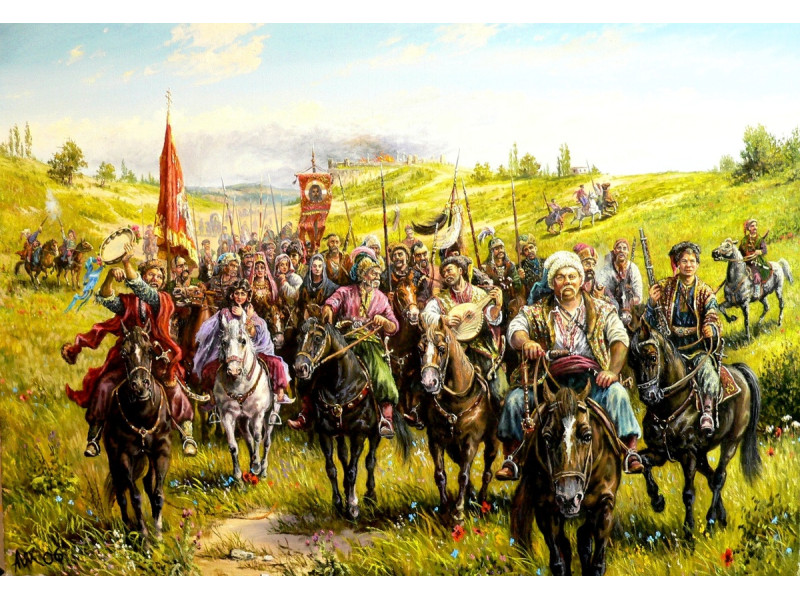Nowadays it is difficult to find a person who has not heard anything about the Cossacks. This topic is covered in fiction and scientific literature, inspires directors and musicians. We do not seek to open America for you, but we have made an attempt to systematize in one material the most popular concepts from the life and everyday life of the Cossacks.

Cossack rank
There is a fairly popular myth that anyone who came to the Sich, crossed themselves, said they believed in God, and drank a glass of vodka could become a Cossack. But in reality, everything was a bit more complicated: a Cossack became a Cossack after a long period of training and drill. In addition, he had to pass an exam for the title of Cossack. Not everyone who wanted to passed such training passed, so the first person he met did not become a Cossack.
Cossack science
A candidate for Cossacks, the so-called "molodyk", had to master fencing and shooting with firearms for seven years, learn to ride a horse skillfully and learn hopaku, which used to be not just a dance, but a type of martial art (like the well-known capoeira to many), which gave advantages in the fight against an opponent. The mentor of the "molodyk" was an experienced warrior, under whom the recruit served as a juror (somewhat reminiscent of the squire of medieval knights). In addition to martial science, the "molodyk" studied literacy, the basics of medicine and astronomy. The most talented also studied the basics of diplomacy and foreign languages (after all, delegations of the Zaporozhian Sich traveled to other countries on diplomatic missions).

Exam for a Cossack
After successful training, the "young man" took the exam for the title of Cossack. It was a humorous test, during which the community tested the Cossack for endurance, agility and courage. The first test: to eat a bowl of peppered borscht, drink a quart (over a liter) of vodka and after such a "lunch" to walk on a log placed between the Dnieper rocks and not fall into the water. Having overcome the first test, he had to overcome the rapids in a boat (it was necessary to swim against the current). The final test was a ride on horseback (on an unridden horse, facing the tail, without a saddle and bridle) across the steppe: the Cossack had to return to the Sich unharmed.
Attitude towards parents and elders
For a Cossack, his parents were a “standard” and “supreme court”: without their consent and permission, he could not even start working. Disrespect for his parents was considered a sin and condemned. A Cossack was also taught to respect old age: regardless of who was in front of him, an old chieftain or an old beggar, you had to respect them equally and bow equally out of respect for their age. Young Cossacks helped older people with the household. They did the work that the old people no longer had the strength to do. In addition, a young Cossack did not allow himself to do anything unnecessary in the presence of his elders: smoke a pipe, speak without permission, sit in their presence, or swear. The word of the elder was decisive during conflicts between young Cossacks – this decision was not appealed and was carried out without further ado.
Cossack's wife
For a Cossack, his wife was the most valuable treasure, because she was the future of the Cossack clan. The Cossacks protected women and took care of their safety. In the family, there was a clear division into women's and men's affairs, and neither spouse poked their nose into the other's affairs. It was a shame for a man to be involved in women's affairs. The community helped the widows of the Cossacks together: both financially, with hard work, and with raising children.
Hermit Cossacks
Single Cossacks were quite common in the Sich. This was facilitated by constant campaigns and wars - the boys simply did not have time to get married. Often a Cossack took a vow of celibacy and devoted himself to military service. Such Cossacks were educators for other people's children - future Cossacks.
Heir
The birth of a son in a Cossack family is a joy for the father... and a sorrow for the mother. From the very birth, the boy was prepared for the Cossack life: drills, hardening. Often, the first words of the boy were not "mom" or "dad", but the commands to the horse "no" and the order to shoot "pu". The boy was given "masculine" gifts: guns, knives, gunpowder, bows and arrows. He had no time for pranks and mischief - after all, he was a future Cossack, a warrior.

Guest in the house
The Cossacks believed that a guest was a person sent by God. The most welcome guests were travelers from distant places and those who needed a roof over their heads. A guest was never denied shelter. He was seated at the head of the table, offered the best food and a better place to rest in the house. And for three days, the guest was not asked who he was or where he was from - this was considered indecent. And even after three days, no one questioned the guest - they only listened to what he was ready to tell. Such hospitality allowed the Cossacks not to take any food for themselves or fodder for their horses on the road - after all, he was a welcome guest and in every village there would be a house in which he would be fed and given shelter.

Cossacks and religion
Everyone knows the attitude of the Cossacks towards religion. Without prayer, the Cossacks did not begin either a meal or business. The church was an important place for the Cossack community. It was often built at the expense of the Cossack elder, decorated with gold and patterns, and icons and banners were ordered from famous masters. The attitude towards the patroness of the Cossacks, Pokrovya, was also special. They asked her for protection and help before campaigns, and they went into battle in her name.
Attitude towards alcohol
Cossacks loved feasting. However, those who liked to look into a glass were not respected in society. Drunkards were not put up for burial, but were driven into the grave with an aspen stake, and they were buried separately from others (as well as suicides).
Cossack tales
Cossacks loved to boast about their military exploits during feasts, but in serious matters they did not lie. It was a great shame for a Cossack to be caught lying. He was no longer trusted.

Cossack campaigns
This phenomenon was an indispensable part of Cossack life. The Cossacks tried not to touch their co-religionists, but Polish, Tatar or Turkish settlements suffered from them (only occasionally they were not destroyed by fire). The Cossacks were cruel warriors and their attacks on neighboring states were in no way inferior to the Tatar-Mongol raids. From each campaign, the Cossacks returned with trophies: valuables, weapons, slaves-hostages.

Cossack entertainment
The Cossacks also knew how to have fun. The most popular was the "bench-on-bench" competition: two groups of Cossacks lined up opposite each other, the Cossacks held each other with their elbows clasped. The main task: to push the opponent's "bench", topple or tear it. The Cossacks also loved tug-of-war: two groups of Cossacks would tug a rope over mud or a puddle (the losers would end up in the mud to the laughter of the spectators). There were also endurance competitions: jumping in a sack. The Cossack had to jump to a certain point and not fall. And what fun would there be without a fight. Fist fights were a popular competition among both young Cossacks and experienced ones. The Cossacks did not shy away from singing and dancing. There were also lovers of fishing and hunting among the Cossacks. For them, it was not only a way to get food, but also to relax and hone their skills. Among the Cossacks' entertainments were also dangerous ones: taking off a fellow soldier's hat with a pistol shot, saber fights (they often competed while intoxicated - this was supposed to simulate the mental state of combat or injury).
Punishment for a crime
The most serious crime was the murder of a Cossack by a Cossack. The punishment was terrible: the murderer was tied up and laid in a grave under the coffin with his victim: the Cossacks believed that the murdered would forever strangle his offender. For a drunken fight with the use of weapons, a leg was broken, if the consequences were more serious - an arm and a leg (which meant excommunication from the Cossack craft). For desertion, drunkenness during a campaign - the death penalty (in sea campaigns - they were thrown overboard, in land campaigns - they were tied to a horse and chased across the steppe until the criminal died). For debts, they could be chained to a cannon carriage (they were released only after the debt was paid or when one of the relatives vouched for the debtor). The most common punishment was chaining thieves to the pillory and beating them with beech sticks for horse theft, robbery of merchants. Sometimes after this punishment, the Cossacks not only survived, but also received money from their comrades for their courage (the Cossacks did not respect cowards and whiners). For minor violations, the Cossacks were banned from holding certain positions and were punished with fines to the "cash register."
Farewell party
When a Cossack was being seen off on his last journey, his horse (if he had not fallen in battle) would walk ahead of the funeral procession (in front of the deceased's family) behind the coffin. A black or red saddlecloth would be placed on the horse, and the Cossack's weapons would be attached to the saddle.
Cossacks and modernity
We can talk about the Cossacks, their beliefs and traditions for a long time. We can draw analogies with modern Cossacks and argue whether they continue the work of the Zaporizhzhia Cossacks. But it is better to simply congratulate the defenders of Ukraine on their holiday - Defender of Ukraine Day and wish them strength and health, as well as remember that at home they are eagerly waiting for them, believe in them and pray for their well-being.




Write a comment